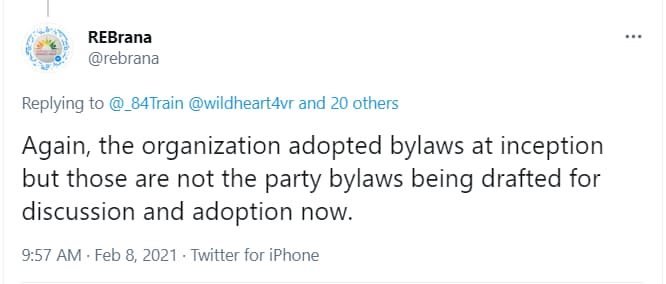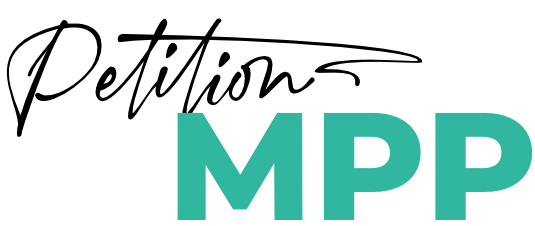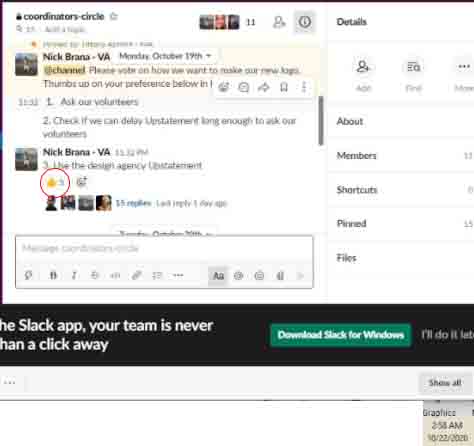MPP has been operating for more than three years without bylaws; volunteers contribute their time and talents, donors contribute money, without anyone knowing the rules by which the organization actually functions.
When a Coordinator’s Circle member was asked why there are no bylaws, the response was "the bylaws committee is working on this." Further inquiries (e.g. who is on the committee, how long have they been working on this) received no response.
MPP’s responses to the bylaws question are contradictory. Rod Brana has stated publicly that bylaws have existed since day 1.

REBrana (Rod Brana)
Again, the organization adopted bylaws at inception but those are not the party bylaws being drafted for discussion and adoption now.
9:57 AM Feb 8, 2021
On December 2, 2020 in a Slack post regarded as a “petition response”, the CC promised that a draft of the bylaws would be made available to the community by December 15, 2020.
The post reads:
As we move past the election, we want to take a moment to pause and reflect on what we have achieved so far. Together, we have built this movement over the past four years, step-by-step. It began with the collection of 50,000 signatures over the course of seven months and was followed by the Convergence Conference at American University, which we hosted to discuss the creation of a major new party. We have been building and forming coalitions ever since.
In July of this year, we took our demands for COVID relief and an end to systemic racism to the homes of our congressional representatives. Our People’s Convention was viewed over a million times and was #2 trending nationally on Twitter, even while competing with professional basketball and the VMAs. It culminated in an overwhelming vote to create a major new political party free from corporate money and influence. This week we voted on the name of our major new party, and look forward to announcing the results across all of our platforms in the morning. As we make major strides and the holidays approach, take a moment to rejoice and celebrate what we have accomplished together.
Now we embark on the next phase of our journey: forming the party. In early December, we will take the momentous step of starting the party in the first state, The Pine Tree State of Maine — and in other states soon after. To set us up for success, we have been working to streamline our processes and plans for the future. To aid our hub organizers, we will be finishing an organizing toolkit on December 1. It will contain useful tools for local organizing. The toolkit, partnered with our Hub Organizing Guide and MPP organizing trainings, will give you the tools you need to effectively run and grow your hub. We will also organize a Welcome Circle to call and greet every new volunteer sign-up, directing them to their local hub or encouraging them to start one. Welcome Circle members will also help match volunteers’ skills and interests with national working groups they can contribute to.
On December 15, we will be sharing our draft bylaws for discussion and feedback. We are currently working on a set with lawyers and experts in party formation and bylaws. They will draw on examples of bylaws from political parties, social justice organizations, and unions. After the draft bylaws are released, we will hold a Bylaws Convention for discussion and amendments, followed by a full MPP membership vote.
Next year, we will hold our Founding Convention. Prior to the convention, we will convene committees to discuss platform policy. We will use the information that we have been gathering in our Forum, and policy recommendations assembled by our Political Outreach Community Group Circles, to inform our platform draft ahead of the Founding Convention, where it will be deliberated further and voted on by the full membership. In order to ensure your voice is heard, please participate in ongoing policy discussions regarding the issues that matter most to you.
We value your organizing and dedication to building the movement, and we look forward to working with you to make our major new party a reality. These projects and others will require everyone’s participation to make sure we are always advancing towards our goal. It is important that we stick together as we move into our next phase of growth. Please feel free to come to any working group coordinator or regional coordinator with questions, comments, concerns, suggestions or ideas.
We face many obstacles and a long journey ahead. Powerful interests stand between us and the political and spiritual renewal we seek in America. There will be victories, and there will be heartbreaks. But by working together, through thick and thin, we will be each other’s strength, and we will transform this country, just as sure as the sun rises in the morning.
We will pass a new social contract, make health care and pre-kindergarten to college free, guarantee a good paying job and a basic income, end mass incarceration and bring the troops home, ensure housing for all and get money out of politics, free the nation from the grip of monopolies and trusts, guarantee a secure retirement and a liveable climate, and so much more. Together we will herald the Second Progressive Era in American history.
We are grateful to be on this journey with you.
Carol, David, Elise, Michelle, Nick, Phil, Regina, Rod, Thomas, Tiffany and Todd
To date, there has been no production of bylaws. The current narrative is that bylaws will be produced when MPP becomes an actual party and volunteers will have an opportunity to participate. No subsequent information has been made available as to the nature of volunteer participation in this process.



